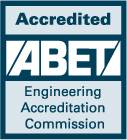ABET Program Accreditation
To view BS Engineering Enrollment and 5 Year Graduate Data please click here
 The Civil Engineering Program at Lafayette College is Accredited by the Engineering Accreditation Commission of ABET”, www.abet.org. The Civil Engineering Program has been designed to satisfy the established program educational objectives and the program outcomes and to fulfill the mission statements of the College, engineering division, and the program. The mission statements of the College, division, and program are provided below in addition to the established program educational objectives.
The Civil Engineering Program at Lafayette College is Accredited by the Engineering Accreditation Commission of ABET”, www.abet.org. The Civil Engineering Program has been designed to satisfy the established program educational objectives and the program outcomes and to fulfill the mission statements of the College, engineering division, and the program. The mission statements of the College, division, and program are provided below in addition to the established program educational objectives.
Program Mission Statement
To provide an exceptional broad-based undergraduate civil engineering education in a liberal arts environment emphasizing student-faculty interaction, opportunities for hands-on learning, scholarship and service, and an understanding of the professional, societal, ethical, and environmental implications of the engineering practice.
Program Educational Objectives
“Program educational objectives are broad statements that describe what graduates are expected to attain within a few years after graduation. Program educational objectives are based on the needs of the program’s constituencies” (definition from the 2019-20 EAC Criteria for Accrediting Engineering Programs). The following Program Educational Objectives were developed in the 2018–19 academic year in consultation with faculty, students, and the Civil Engineering Advisory Board. Objective 4 was revised in the 2025–26 academic year in response to the observed and forecasted rate of change in engineering practice.
The civil engineering program at Lafayette College will produce graduates that, within a few years of graduation, will:
- apply engineering knowledge, problem solving skills, sustainability principles, and creativity to address the evolving needs of society;
- demonstrate effective communication skills, teamwork, and leadership;
- demonstrate ethical and inclusive behavior and a commitment to their profession and society; and,
- sustain professional growth, via licensure and ongoing education, and thoughtfully apply emerging tools to meet the demands of an evolving engineering practice.
Student Outcomes
In fall 2017, the Department of Civil and Environmental Engineering adopted the ABET student learning outcomes for the civil engineering program:
- an ability to identify, formulate, and solve complex engineering problems by applying principles of engineering, science, and mathematics
- an ability to apply engineering design to produce solutions that meet specified needs with consideration of public health, safety, and welfare, as well as global, cultural, social, environmental, and economic factors
- an ability to communicate effectively with a range of audiences
- an ability to recognize ethical and professional responsibilities in engineering situations and make informed judgments, which must consider the impact of engineering solutions in global, economic, environmental, and societal contexts
- an ability to function effectively on a team whose members together provide leadership, create a collaborative and inclusive environment, establish goals, plan tasks, and meet objectives
- an ability to develop and conduct appropriate experimentation, analyze and interpret data, and use engineering judgment to draw conclusions
- an ability to acquire and apply new knowledge as needed, using appropriate learning strategies